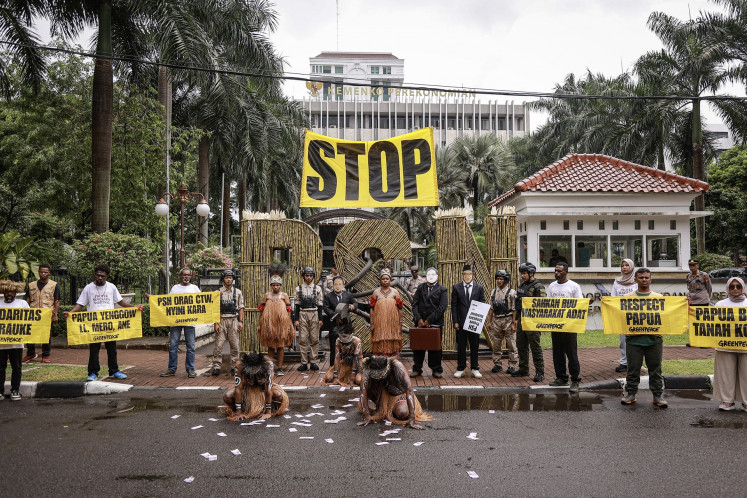Popular Reads
Top Results
Can't find what you're looking for?
View all search resultsPopular Reads
Top Results
Can't find what you're looking for?
View all search resultsPrabowo campaign and cultural connectivity in Indonesia's marketing landscape
Change text size
Gift Premium Articles
to Anyone
A
recent marketing campaign showing the rise of presidential candidate Prabowo Subianto to take an overwhelming lead in the 2024 election, likely toward a formal declaration as president-elect in March, is a remarkable success story.
For this year’s presidential campaign, Prabowo's strategists portrayed the former general as an endearing grandfather figure, employing artificial intelligence (AI) to craft a digital persona imbued with youthful and childlike attributes.
This deliberate strategy to soften Prabowo's public image effectively diverted attention from his formidable persona of the past. Notably, irrespective of any controversial actions that an individual’s own grandfathers may have undertaken in their youth, the universal affection for grandfathers served to humanize Prabowo's character in the eyes of the Indonesian people.
Moreover, his campaign astutely capitalized on the cultural reverence for courtesy ingrained in Indonesian society. Prabowo's team adeptly reframed every critique and attack against him as an affront to this cherished value of courtesy.
Consequently, rather than scrutinizing Prabowo's past actions, people found themselves empathizing with him and perceiving such criticisms as uncouth and inappropriate. This strategic maneuver not only shielded Prabowo from negative perception but also elicited a sense of sympathy and solidarity from the public.
Prabowo's 2024 campaign underscores the significance of exploring the emic or cultural dimensions inherent in marketing endeavors. By aligning marketing strategies with deeply ingrained cultural values and sentiments, businesses and political entities alike can forge authentic connections with their target audiences, thereby enhancing the effectiveness and resonance of their messaging.
In the dynamic global business arena, success extends beyond the mere provision of high-quality products or services: It hinges on establishing profound connections with consumers. Nowhere is this principle more evident than in Indonesia's vibrant business landscape, where cultural intricacies profoundly shape consumer behavior and preferences.
Understanding Indonesia's cultural mosaic: An essential business imperative
As Southeast Asia's economic powerhouse, Indonesia offers a myriad of opportunities for businesses seeking to expand. However, penetrating this diverse market requires a profound understanding of the country's rich cultural tapestry. With 17,000 islands and diverse ethnic groups, Indonesia embodies a mosaic of traditions, beliefs and values.
At the core of Indonesian culture is the principle of gotong royong, emphasizing communal cooperation and mutual support.
This communal ethos permeates all facets of society, exerting a significant influence on consumer behavior. Companies striving for success in Indonesia must grasp the importance of nurturing relationships and fostering trust with and within local communities.
Power dynamics: Navigating hierarchies
Respect for authority and hierarchical structures is deeply ingrained in Indonesian society. In business settings, decisions often emanate from senior figures or familial heads, with subordinates expected to defer to their directives.
For companies operating in Indonesia, recognizing and respecting these hierarchies is pivotal to establishing credibility and rapport.
For example, consumer goods companies often collaborate with influential community leaders or local elders to endorse their products. By aligning with respected figures, businesses can leverage existing power dynamics to enhance their brand image and credibility among consumers.
Individualism vs. collectivism: Fostering community bonds
Despite the growing influence of individualism, particularly in urban centers like Jakarta, Indonesia fundamentally remains a collectivist society, with strong emphasis on familial and communal connections. This collectivist mindset significantly shapes consumer decisions, with people often prioritizing purchases that benefit their wider social networks.
In the consumer goods sector, brands capitalize on this communal mindset by emphasizing the social impact of their products.
For instance, companies may launch initiatives that contribute a portion of sales to community development projects, or they may collaborate with local artisans to create culturally relevant products. By aligning their offerings with communal values, businesses can forge stronger connections with Indonesian consumers.
Masculinity and gender dynamics: Adapting to shifting norms
Traditional gender roles continue to wield influence in Indonesia, particularly in rural and conservative areas. However, societal attitudes toward gender are evolving, with a growing recognition of gender equality and diversity.
For businesses navigating this evolving landscape, a nuanced approach to marketing and branding is essential.
For instance, consumer goods companies may launch campaigns that challenge traditional gender stereotypes or feature diverse representations in their advertising.
By embracing progressive attitudes toward gender, brands can resonate with the evolving values of Indonesian consumers and position themselves as socially conscious entities.
Tolerance of ambiguity: Striking the right balance
Indonesian consumers exhibit varying levels of tolerance toward ambiguity, ranging from a preference for clear, straightforward messaging to an appreciation of nuanced communication.
Companies must navigate this diversity by striking a delicate balance between providing clarity and allowing room for interpretation in their marketing efforts.
For example, consumer goods brands may employ storytelling techniques that evoke emotion and resonance while ensuring their messaging remains clear and accessible.
By catering to the diverse preferences of Indonesian consumers, businesses can effectively engage their target audience and drive brand loyalty.
In essence, success in Indonesia's competitive consumer goods landscape requires more than just exceptional products: It demands a nuanced understanding of cultural nuances and a tailored approach to consumer engagement.
By embracing Indonesia's rich cultural diversity and adapting their strategies accordingly, businesses can forge lasting connections with consumers and drive sustainable growth.
Emic vs. etic marketing perspectives
When it comes to marketing in Indonesia, businesses must understand and appreciate both emic (internal cultural perspectives) and etic (external cultural perspectives) approaches.
Emic marketing involves understanding a culture’s values, norms and beliefs from within the culture itself, while etic marketing refers to analyzing a culture from an outsider's perspective.
For example, an emic approach to marketing in Indonesia may involve deep immersion in the local culture, understanding the nuances of gotong royong and crafting marketing messages that resonate with communal values.
On the other hand, an etic approach may involve conducting market research to identify overarching cultural trends and then tailoring marketing strategies accordingly.
By embracing both emic and etic perspectives, businesses can develop marketing strategies that are both culturally sensitive and effective in engaging Indonesian consumers












